A Rejuvenating Korean Soup
Whole Chicken Stuffed with Sweet Rice, Pine Nuts, and Garlic
In a Broth Simmered with Ginseng, Ginger, Red Dates, and Gingko Nuts
At first it might seem counter-intuitive to serve a pot of hot steaming soup on summer’s most sweltering days. But if one considers the ingredients in samgyetang, the popular Korean ginseng chicken soup, the choice starts to make sense.
Ginseng’s properties are said to be rejuvenating and revitalizing, a booster for the libido as well as the immune system. Hot soup is said to help regulate body temperature in oppressively hot weather. The energy promoting quality of ginseng plus the soup’s rich nutrients help to regain the loss of stamina on super sultry days.
Medicinal attributes aside, I instantly fell in love with this soup. I adore the presentation, where a whole chicken fits snugly into a pot surrounded with mysterious-looking vegetables, fruit, and nuts. Sweet short-grain rice with pine nuts and garlic cooks inside the chicken, a technique I had never seen before.
After an hour of simmering, an intriguing chicken soup is served in its own pot. The sweetness of the jujubes, the earthy slightly-bitter ginseng, and the glutinous rice produce a uniquely flavored somewhat cloudy soup. Diners can place pieces of chicken, rice, and all the accompaniments into their own bowls, then ladle the hot broth over the top. Salt, pepper, and scallions are served on the side so each diner may season the soup to his liking.
Samgyetang – Korean Ginseng Chicken Soup Recipe
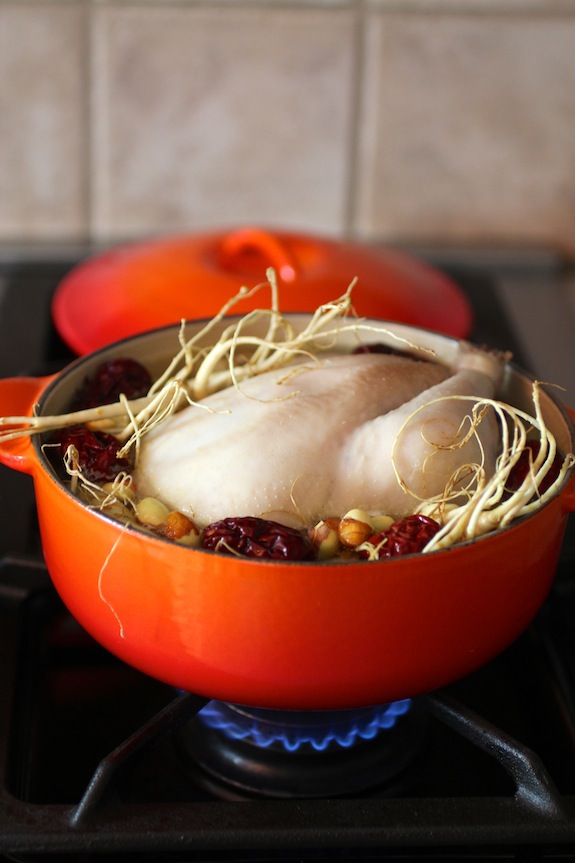
This recipe serves 2 people, generously. If two pound chickens are not readily available, cornish game hens or the more common 3 – 4 pound chickens can be substituted, adjusting the recipe accordingly.
- 2 lb. chicken, rinsed
- 1 c. short-grain rice
- 4 garlic cloves, smashed
- 2 T. pine nuts
- chicken broth, at room-temperature
- 3″ knob ginger, peeled
- 6 jujubes (korean red dates)
- 2 ginseng roots
- a dozen gingko nuts, shelled
- scallions, for serving
- salt and pepper

Soak rice in cold water for 20 minutes. Drain the rice and combine with pine nuts and garlic to make the stuffing. Stuff the chicken with the rice mixture then truss the chicken to ensure the rice stays inside the bird while cooking.
Choose a pot in which the chicken will fit snugly. Place chicken in the pot and add chicken broth to almost fill the pot. Cover and bring to a boil. Skim off fat and any scum.
Once the broth is boiling – add jujubes, ginseng, gingko nuts, and ginger. Reduce heat and simmer, covered, for 60 to 90 minutes until the chicken is cooked through and the rice is soft.
Serve the samgyetang in its cooking vessel.
To make the garnish, slice 3 -4″ long pieces of scallion very thin. Place in a bowl of ice water until it curls. Drain and place the onion on top of the chicken.
Salt, pepper, and sliced scallions are served on the side…

…to season the bites of chicken as you eat.
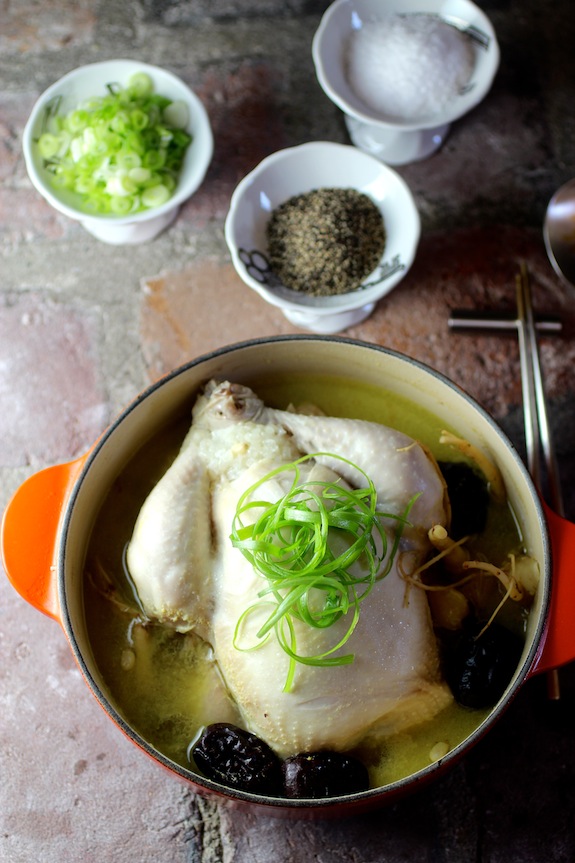
Enjoy the unique flavors and health benefits of samgyetang this summer!

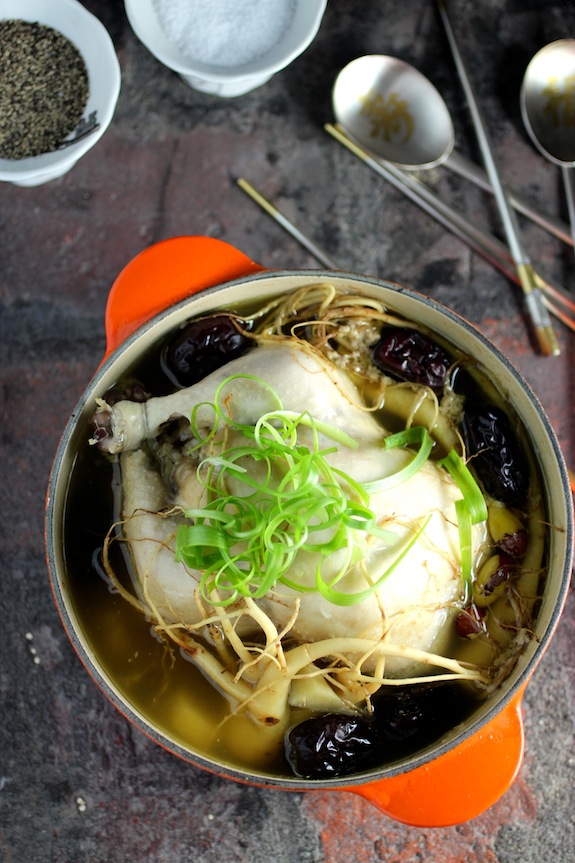
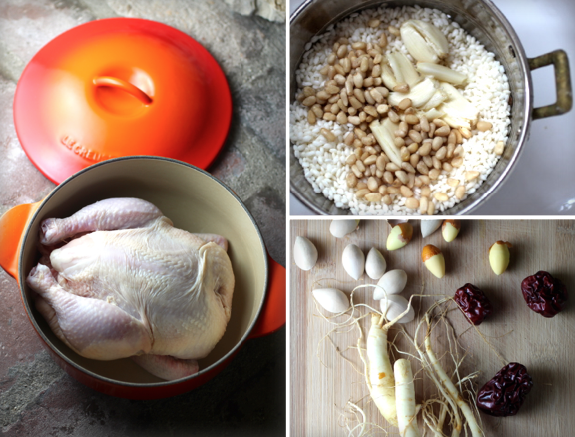
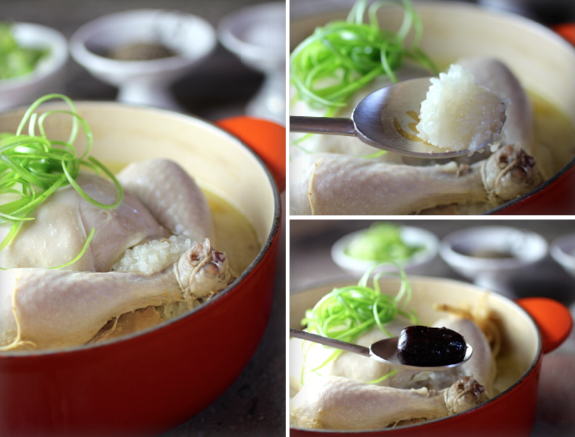
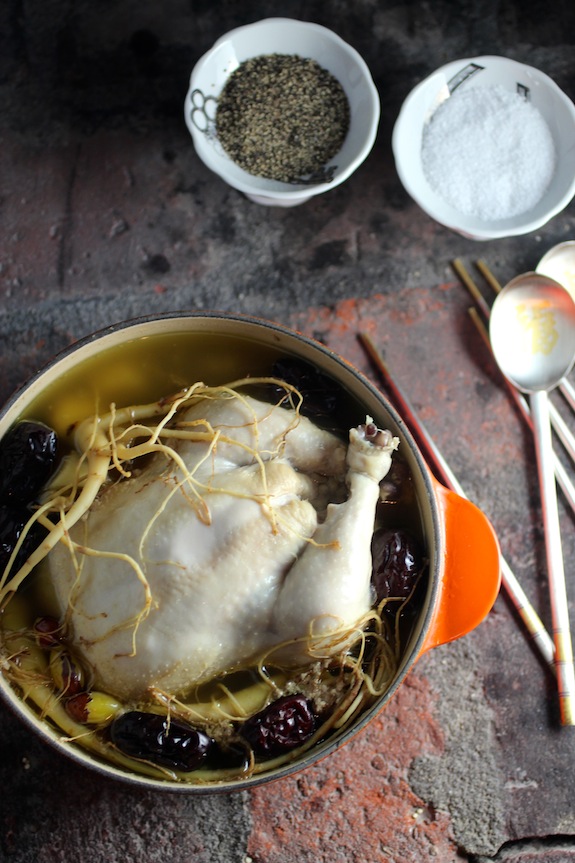
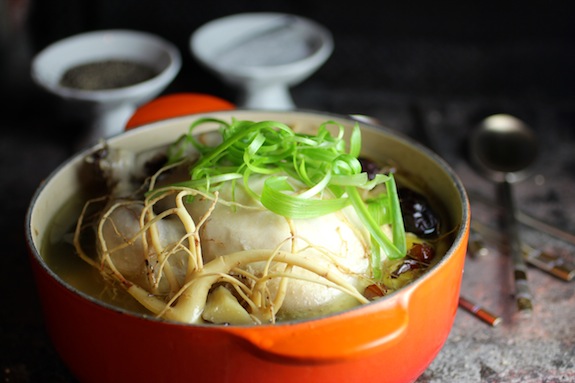
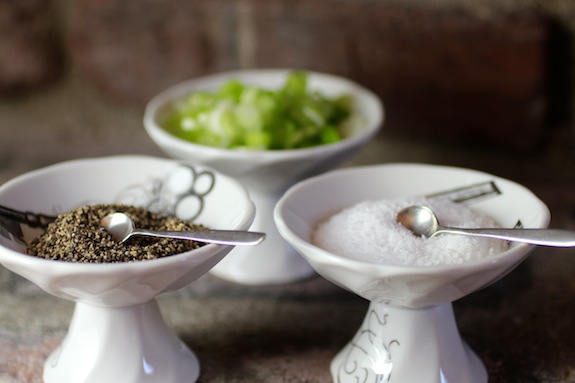
A boiled chicken never looked so good.
Never seen anything like this, but sure looks good. The first picture belongs in a magazine, it’s that good.
Thanks Ash – I was hoping the images conveyed the flavors of this intriguing soup…
LL
Mmh, this needs some homework as far as the ingredients are concerned: ginseng rootsand gingko nuts both being in short supply in rural Australia 🙂 ! But, orders can be placed with friends in the big Smoke, so the beautiful simple recipe has been well and truly saved!
Mmh, this chicken soup recipe looks amazing and tasty.
And- as always- love your pics Lori!
Very revitalizing indeed Lori Lynn. The weather is cooler and soup is in my future.
I am always SO inspired when I drop by, LL. Your chicken looks spectacular…but I think I need an IV of ginseng for a direct hit of rejuvenation and revitalization 😉 along with your soup.
OK. First where the heck have I been? I have missed so many of your posts. I must sign up for yoursite. Next, this is a beautiful photo essay. Kudos to you. I know absolutely nothing of Korean cuisine, and I am utterly really intrigued by this. Thanks for the intro.